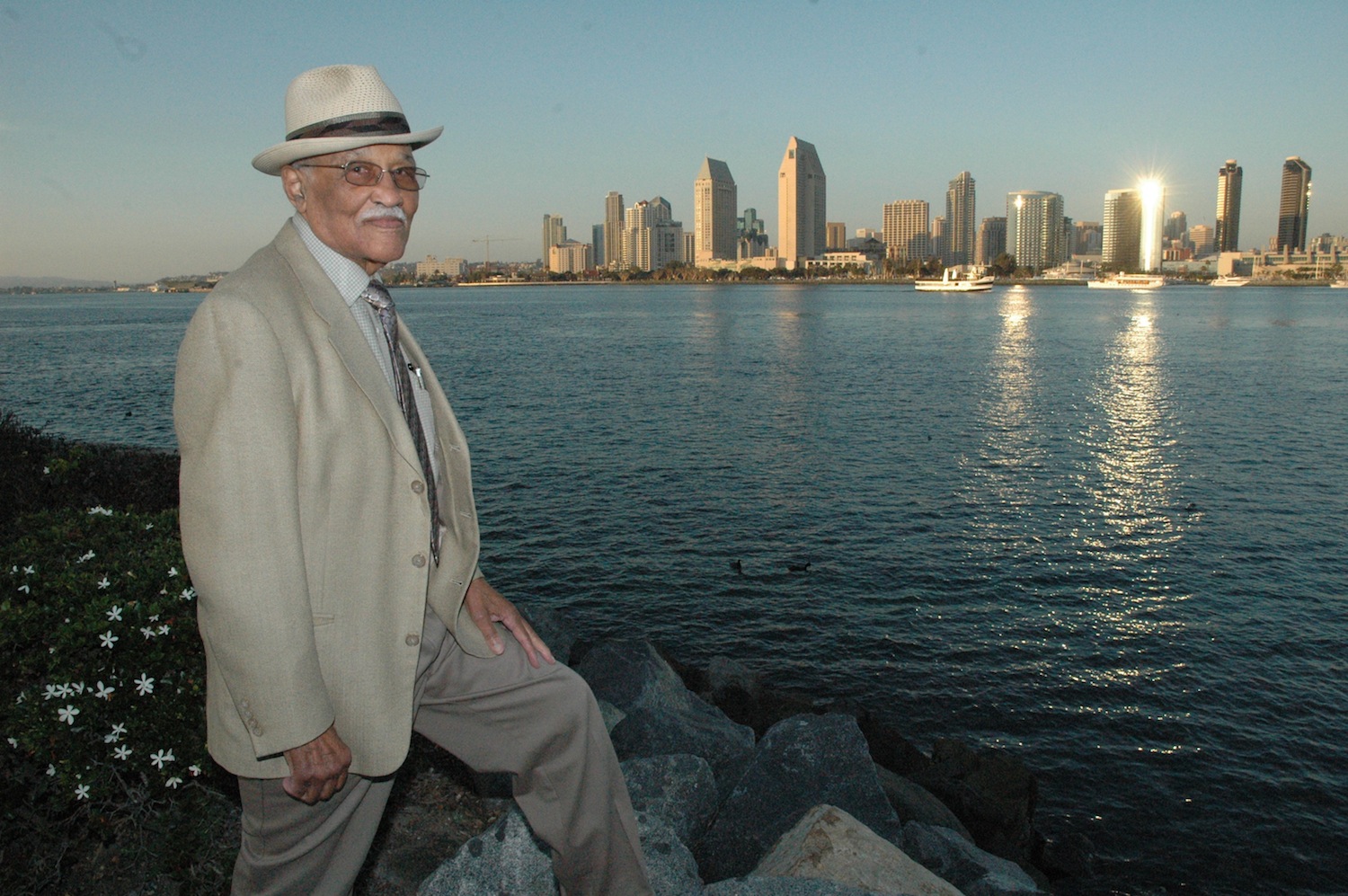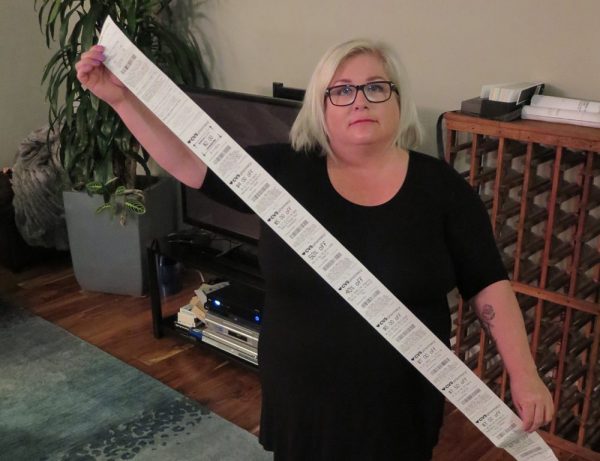Daily Business Report-Sept. 10, 2015
Leon Williams, a former San Diego Councilman and a former county Supervisor.
Leon Williams to be Feted Today at the
Same Hotel That Once Turned Him Away

In 1941, Leon Williams, a recent high school graduate from Bakersfield, arrived in San Diego and immediately felt the sting of racial discrimination. The Pickwick Hotel next to the Downtown bus depot refused him a room because he was black. Its Piccadilly Lounge wouldn’t serve him, nor would Centre City’s other white-only restaurants.
Undeterred, Williams went on to break San Diego’s racial barriers, becoming the first African-American elected to the San Diego City Council. He was also the first African-American on the San Diego County Board of Supervisors. The policies he supported led to the creation of the Centre City Development Corp. and to a dynamic downtown renewal.
Today, Williams will return to a lunch in his honor at the same hotel that once turned him away. The Pickwick Hotel has been renovated and is now the Sofia, a boutique hotel. San Diego’s history of segregated hotels is a thing of the past
Sofia’s Currant American Brasserie is located at 140 W. Broadway.
The event celebrates a newly released book about his life and accomplishments, “Together We Can Do More: The Leon Williams Story.” It was written by Lynne Carrier and published by Montezuma Publishing at San Diego State University.
The book also focuses on Williams’ efforts to make San Diego an inclusive, multicultural city and on the political techniques he used to achieve his goals.
Click here to purchase the book online.
__________________________________________________
San Diego CFOs Expect Increased
Hiring in the Next Six Months
San Diego executives expect professional-level hiring to pick up in the next six months, according to the San Diego Professional Employment Forecast from Robert Half. Sixteen percent of San Diego chief financial officers anticipate their company will create new jobs in the next six months, up seven points from the previous six-month period. Another 70 percent plan to hire for open roles.
“The San Diego hiring outlook is strong, and we’re seeing particularly high demand for skilled candidates in the construction, property management, healthncare, biotech and technology business sectors,” said Brett Good, senior district president for Robert Half in San Diego. “As a result, companies are working quickly to hire top candidates, placing emphasis on competitive compensation and benefits packages.”
Organizations looking to add staff may face difficulties, Robert Half’s research shows. Fifty-four percent of San Diego CFOs surveyed said it’s somewhat or very challenging to find skilled candidates for professional-level positions today. This compares to 49 percent in the previous six months.
According to the Professional Employment Forecast, San Diego CFOs are optimistic about their company’s growth. Eighty-five percent of executives reported being somewhat or very confident in their company’s prospects for growth in the next six months. This compares to 83 percent in the previous six months.
To address staffing challenges, many firms are strengthening the salary and benefits they offer. Thirty-eight percent of San Diego CFOs surveyed said they have modified their company’s compensation plan in the past 12 months as a way to enhance recruiting and retention efforts.
Water Authority Prices
$195 Million Bond Sale
The San Diego County Water Authority on Wednesday put up for sale a $195 million bond that will reduce the cost of financing vital water supply reliability projects over the next two decades, the agency announced.
The sale generated more than $1 billion in demand by a diverse array of investors, allowing the Water Authority to lower yields in each maturity versus the initial launch of the pricing. Despite today’s market volatility, investors cited confidence in the Water Authority’s strong credit, management team, and its history of successful planning and project execution to provide water supply reliability.
When completed, the sale of Senior Lien Water Revenue Refunding Bonds Series 2015A will refund $195 million in long-term, fixed-rate bonds issued in 2008 and 2010. Refinancing will save the Water Authority $15.1 million through 2029 on a net present-value basis. Closing is expected in about two weeks.
“This strategic move is part of our overall effort to cut expenses so we can continue to provide a safe and reliable water supply at the lowest possible cost,” said Water Authority Board Chair Mark Weston. “By maintaining strong credit ratings even during challenging drought conditions and systematically seeking better rates on our debt, we have saved ratepayers tens of millions of dollars in recent years and reduced the impact of future water rate increases.”
Combined with the current transaction, the Water Authority’s refinancing actions over the past five years will save ratepayers an estimated $85 million in interest on a present-value basis over the life of the bonds.
The Water Authority is nearing completion of one of the largest capital improvement programs among California urban water agencies, with a $2.8 billion budget and a two-year appropriation of $136.8 million for fiscal years 2016 and 2017.

Planet3 Gets $10 Million in Funding
To Launch Digital Learning Platform
Planet3, an exploration-based learning company founded by the former president of the National Geographic Society, Tim Kelly, and UC San Diego research scientist Dr. Albert Yu-Min Lin, has secured $10 million in funding to launch a digital learning platform that presents the entire Earth as a living laboratory and promotes interest and achievement in STEAM (Science, Technology, Engineering, Arts and Math) subjects.
The initial round of funding was financed by Switch, the Nevada-based developer of the renowned SUPERNAP Data Centers, led by CEO Rob Roy.
Modeled on the Next Generation Science Standards, Planet3’s instructional design combines immersive game-based challenges and real-world context to provide exploration-based learning experiences. Planet3 emphasizes data analytics and visualization to encourage students to gather evidence and craft their own conclusions.
Integrating the most advanced Earth observing networks of NASA, NOAA, and other research entities, Planet3’s hyper-connected platform enables students to explore and contribute to real world science.
The company’s first product focuses on middle school Earth, Life, and Physical Sciences, with an initial release scheduled for fall 2016.
The Planet3 team is comprised of top leaders in education, science, game design and technology including: co-founder and Chief Science Officer Dr. Albert Yu-Min Lin; Chief Creative Officer Vijay Lakshman, an expert game developer; Chief Learning Officer Kelly McGrath, former head of K-12 Science Curriculum Department at Pearson.
Many Firms in Business Improvement
Districts Fail to Register to Pay Assessments
City News Service
Numerous firms within the boundaries of San Diego’s 18 business improvement districts have failed to register with the city to pay assessments that fund BID programs, according to a report released Wednesday by the City Auditor’s Office.
BIDs– clusters of businesses in areas like La Jolla, El Cajon Boulevard and Little Italy — assess enterprises in their territories according to a city-approved formula and use the money to pay for group promotional efforts. The assessments are paid to the city treasurer as part of the business tax process.
When they compared a database of private businesses to a list of paid BID assessments, about 26 percent were noncompliant, the auditors said.
A separate comparison to data from the county Assessor’s Office found the noncompliance rate ranged from 30 percent to 61 percent in 11 BIDS surveyed by the auditors.
In both cases, some of the businesses are likely to be exempt from paying the assessment, according to the report. The results did not specify a potential dollar loss.
The auditors recommended the city treasurer improve compliance rates by using additional data to find businesses that operate within BID boundaries. They also suggested that the Economic Development Department, in consultation with the treasurer and BID association management, establish and document a standardized process for BIDs to report businesses within districts that may not be paying their assessments.
The auditors also suggested that Economic Development create metrics to evaluate BID performance. In a memo issued last week, city Treasurer Gail Granewich and Economic Development Director Erik Caldwell said they agreed with the recommendations.
The first BID in California was established in downtown San Diego in 1970. The City Council formalized guidelines for the districts 16 years later.
Annual assessments generally range from $40 to $500 per business, depending on the district and other factors, according to the report. Some fees, however, range up to $1,200, and establishments defined as “anchor” businesses can pay as much as $5,000 a year.
Chamber Honors Small
Business Award Winners
Four San Diego businesses received top honors at the San Diego Regional Chamber of Commerce’s 2015 Small Business Awards reception Wednesday . Presented annually, the awards honor local small businesses for their significant contributions as drivers of economic growth throughout the region.
The 2015 Small Business Award winners are:
• Outstanding Emerging Business of the Year: Confirm Biosciences
• Most Innovative Product or Service: Bitcot Inc.
• Excellence in Customer Service: James Gang Company Inc.
• Most Innovative Marketing Campaign or Concept: Challenged Athletes Foundation
“Small businesses are a vital part of our economy, especially in San Diego, where 74 percent of local companies have fewer than 10 employees. Small businesses bring character to our communities, provide jobs, and fuel the American dream,” said Jerry Sanders, President and CEO of the San Diego Regional Chamber.
J. Craig Venter: Humans Have
Capability to Control Evolution
People now have the capability to control evolution, J. Craig Venter tells the WorldPost, but they don’t yet have the “wisdom to do it or the knowledge to do it in a safe fashion.”
He notes that it’s been five years since his team at the J. Craig Venter Institute produced the first synthetic cell. This along with advances in genome editing show that humans can now direct evolution, according to Venter. But, he notes that he and other scientists have backed a moratorium on such human work until the all consequences of such tinkering have been worked out.
In a fruit fly, for instance, Venter says that a wing defect could be traced to a certain structural protein whose gene could be fixed. But, he adds, that gene could also direct other earlier developmental processes, and instead of fixing the wing defect, the whole fly could become deformed.
“If we assume we know what a gene that we’re changing does, but it actually changes overall development or changes some other process we did not have proper understanding of, that’s called ‘experimentation’,” he says. “And that is a pretty dangerous thing to do with humans.”
More complete knowledge is needed, he says, estimating that researchers only know the function of about 10 percent of the human genome. “We know a lot about a little bit; we know far less about a lot more. We don’t know most of the real functions of most of the genes,” he says. “A big percentage of that can potentially come in the next decade as we scale up to get huge numbers and use novel computing to gain a deeper understanding.”
Malama Composites Gets USDA’s
‘Biobased’ Product Certification
Bruce Bigelow/Xconomy
Addressing the needs of a climate-changing world seems like an important cause, but many cleantech startups that are developing sustainable products face an intractable challenge.
Producing a “green” alternative for an industry already using petroleum-based raw materials usually requires selling a comparable product at a competitive price. But getting those costs down is often problematic, and often means ramping up sales volume.
So getting an official “Certified Biobased Product Label” from the U.S. Department of Agriculture (USDA) represents a significant step for San Diego’s Malama Composites. The startup, founded in 2009, mixes sustainable green materials like castor oil with methylene-based compounds to make high-quality structural foam that has good insulating qualities and water resistance. While methylene is a petroleum-based product, it is far less harmful than toluene, a standard but toxic ingredient used to make many rigid foams.
The designation means that Malama’s Studio BioFoam and Pacific BioFoam products are now on the federal government’s list of preferred bio-products—and meet mandatory purchasing requirements for federal agencies and contractors under the biopreferred program.
The USDA certification means that independent labs have verified the company’s bio-product claims, and the USDA continues to monitor the company’s claims.
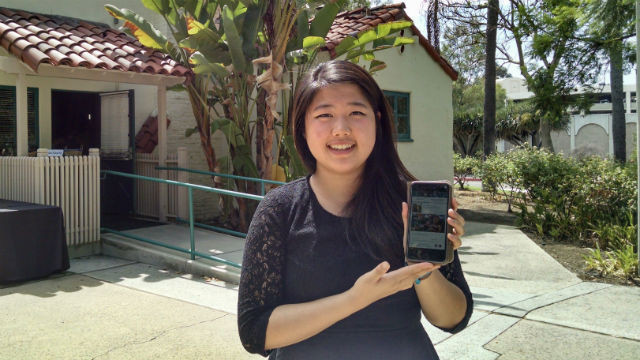
Millennials Are Future of Philanthropy — If Nonprofits Adapt
Times of San Diego
Millennials — those Americans born from 1980 to 2000 — represent the future of philanthropy, and nonprofits must to adapt to them, three young San Diego social activists said Wednesday.
“The old ways of giving back are just not enough,” said Winnie Xu of Giventure, a company developing a mobile app to help Millennials volunteer in their communities. “Nonprofit doesn’t mean you can’t have a cool business model.” The UC San Diego senior said it is important for nonprofits to experiment with new techniques for raising money and involving people, even that increases of the possibility of making a mistake.
Xu and two other innovators in philanthropy spoke to more than 75 people at the picturesque Scripps Cottage on the San Diego State University Campus. The event was part of the San Diego Foundation’s Future40 series exploring new ideas in philanthropy.
“As Millennials, it is our time to step up to create solutions,” said Nate Howard, founder of the Movement BE, a nonprofit organization that helps young people discover their story through spoken word poetry.
“If you don’t know who your are, someone’s going to tell you who you are,” he said, explaining his challenges growing up in southeast San Diego where friends were involved in gang violence.
Howard said direct involvement in philanthropy is crucial, especially with young people who need mentors. “I need people not just to give money, but to give time,” he said.
Macy Olivas, executive director of the Patricia & Christopher Weil Foundation,
said the students aided by her foundation have the potential to give back throughout their lives. She recommend that nonprofits build networks of people they have helped.
“Philanthropy and scholarship giving is a two-way street,” she noted.
SDSU Entrepreneurship Program
Ranked Among Best in the Nation
The College of Business Administration’s undergraduate entrepreneurial program at San Diego State University has been ranked as the eighth best among the nation’s public universities by U.S. News & World Report. It was ranked 21st best program for all universities in the U.S.
The ranking was disclosed in the publication’s annual Best Colleges Ranking, which also listed the Massachusetts Institute of Technology, the University of Southern California and UC Berkeley among the top 26 programs in the nation.
The publication also ranked SDSU’s international business program as the fifth best among U.S. public universities and ninth best among all universities.
Youngevity International
Opening of Office in Singapore
San Diego-based Youngevity International Inc., a direct marketer of nutritional and lifestyle products, announced today the planned opening of its office in the Republic of Singapore. Youngevity International (Singapore) PTE LTD, a wholly owned subsidiary of Youngevity, was formed on March 10. The company finalized lease negotiations for its Asia-based headquarters on Aug. 17.
The Singapore office is strategically located in the heart of the Orchard Shopping District which is located at the southernmost tip of the Asian continent.
Steve Wallach, Youngevity’s CEO, stated, “We chose Singapore because of its advanced, successful free-market economy, featuring an open and corruption-free environment. Internet access is readily available in Singapore, with a connectivity rate of over 99 percent. Singapore will be our launch pad into the consumer-driven emerging markets of Southeast Asia, China and India.”
The build out and customization of the new office began two weeks ago with completion anticipated in early October. A core grouping in excess of 20 products have already been approved for the Singapore marketplace with first products shipments anticipated to leave for Singapore this month. Youngevity International (Singapore) PTE LTD projected soft launch Nov. 1 with an official opening slated for the first quarter of 2016.
Personnel Announcements
Katie Yee Joins Latitude 33
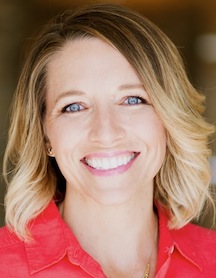
Katie Yee has joined Latitude 33, a San Diego-based planning and engineering firm, as director of business development and marketing.
Yee has more than 13 years of marketing experience in San Diego working in housing, construction and engineering.
A graduate of San Diego State University, Yee is involved with CREW (Commercial Real Estate Women) San Diego as a member and leading its UCREW (University CREW) program. She is on the Building Industry Association of San Diego County’s events committee, the Downtown San Diego Partnership events and membership committee and served as past chair of that organization’s famed Alonzo Awards in 2013
Yee is one of SD METRO Magazine’s 40 Under 40 Award winners for 2015.
She is also a consultant of the year finalist for the BIA ICON Awards 2015, which will announce its winner on Sept. 19 along with other industry awards.
Cubic Appoints Amy Kruse
Chief Technology Officer
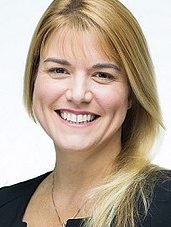
Cubic Corp. announced the appointment of Amy Kruse as vice president and chief technology officer of Cubic Global Defense. Kruse will be responsible for accelerating and enhancing CGD’s strategic research and development portfolio. She will also pursue emerging technologies to drive innovation for both the overall business and the core CGD business areas.
Kruse joined Cubic in March 2014 as vice president of innovation when the company acquired Intific,Inc., an Austin, Texas-based company focused on software and game-based solutions. In this role, Kruse led the business development efforts within CGD as well as the strategic engagement of new clients for Cubic. Kruse first joined Intific in January 2010 as the executive director of the neuroscience division, in which she managed the release of Intific’s premier commercial product, the NeuroBridge software platform.
Previously, Kruse served as a government civilian program manager in the Defense Sciences Office at the Defense Advanced Research Projects Agency (DARPA) from 2005 to 2010. Before DARPA, Kruse served as a technology and program management consultant at Strategic Analysis Inc.
CORRECTION
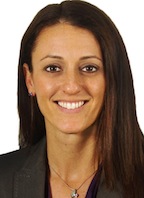
The bio for Windus Fernandez Brinkkord, one of SD METRO’s 40 Under 40 Award winners, erroneously said that she and her husband, Kurt, founded the Immerman Angels organization. It should have stated that the couple “found” the organization. The organization pairs cancer survivors and cancer spouses with other people going through the same ordeal.

